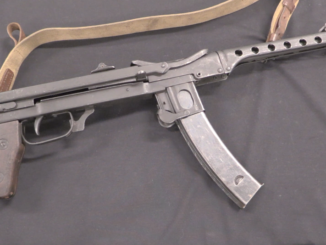During the Russo-Japanese War, the Japanese government helped smuggle arms to potential revolutionaries in Russia, in hopes of provoking a domestic crisis that would divert Russia military force form the war. This included a plot to buy many thousands of surplus Vetterli rifles (as well as C96 Mausers, Webley revolvers, and a few other odds and ends) and ship them to St Petersburg. The Japanese provided the freighter SS John Grafton, and it loaded up the weapons in Copenhagen.
The first plan was to unload a few guns in Helsinki and take the rest to St Petersburg; this was scrapped when the ships intended to help unload failed to appear at the scheduled rendezvous. A new plan was formed to drop all the guns in Finland, and the Grafton headed north into the Gulf of Bothnia. When it went to start unloading at Pietarsaari, it ran aground and became stuck. Worried about the response of Russian security forces, a small fraction of the guns were unloaded and then the ship scuttled.
In a rare true example of a “tragic boating accident”, a number of local divers spent several nights covertly bringing guns up form the wreck, including the example we have to see today. Ultimately there was no revolt against the Russian government in 1905, and the Vetterli saw at most very limited use in the eventual 1917 war for Finnish independence. They were not used by the military or the Civil Guard, and mostly became civilian hunting rifles. The Mauser pistols and Webley revolvers did see more fighting, though, as they were more modern and their ammunition more readily available.
Thanks to the viewer in Finland who loaned me this very cool rifle to film for you!




Great story!
When Finns co-operated (though had no luck in this very enterprise), Poles from two different political camps – who had an incomparably heavier Empire-wrecking potential – were in Japan, busily sabotaging each other’s efforts…
This sounds like the plot for a comedic spy movie.
Voyage of Baltic Fleet to Vladivostok featured so incredible that it seems more fitting comedy, just to summarize they:
– firing at British fishing vessel at North Sea presuming that they are Japanese warships(!) which almost caused war between Britain and Russian
– also at North Sea Baltic Fleet managed to enact friendly-fire, which lead to loss of life
– mentioned losses of life low-numbered thanks to very poor aiming
for more data see https://www.warhistoryonline.com/instant-articles/russias-doomed-baltic-fleet.html
…exactly; or a cheap historical drama.
There were two of them, Polish Alpha Mails, in Japan, in 1905: Piłsudski (then a socialist) and Dmowski (a nationalist right-winger).
And a few years earlier, Piłsudski – definitely a more dashing figure – was more successful with a girl Dmowski had been courting…
No wonder the Japanese (who had their independent sources of information) decided this would be a rather poor investment, either way.
Poland’s reputation for internecine internal division didn’t come out of a vacuum, and it didn’t cease at all while they were split up by their neighbors, either. You have to go to Ireland to find similar idiocy; if either country had managed to get their acts together, they’d have been well able to maintain independence. However, comma… Poles will be Poles, and the Irish insist on being Irish, much to their own detriment. Hopefully, they’ve learned their lessons, but… History says they’ve always been like that, and likely always will be.
I believe that a critical examination of the history and politics of countries is an important aspect of analysis. However, it’s also crucial to understand that the history of each country is complex, and its study requires an objective approach and attention to all aspects of the situation. From the history lessons in college, the topic that stuck with me the most was the importance of communication. We were once tasked with conducting research on “what could happen if humanity communicated better” I then used https://papersowl.com/examples/communication/ that helped me better shape my opinion.. Criticism can highlight problems, but it’s also important to consider the ways to address these issues and promote future development.
A few more details from a piece I’m currently writing on the Vetterli: ‘The man who coordinated the actions of a bewildering number of Socialist revolutionary and nationalist groups, and partially paid for some of the rifles sent to the Caucasus, was a Japanese intelligence officer, Colonel Akashi. He believed that his task was to aid the war effort against Russia by fomenting unrest in an already ramshackle empire, and he did so with gusto and to the considerable annoyance of the Russian government. The Vetterli rifles were purchased by a “Wealthy Swiss anarchist” from an “old school friend”, who was a Colonel in the Swiss army serving in an artillery arsenal, a man who really should not have been selling rifles to an anarchist.’ More here: Fält, Olavi K, Kujala, Antti, (eds), Inaba Chiharu (trans) “Colonel Akashi’s report on his secret Cooperation with the Russian Revolutionary Parties during the Russo-Japanese war” Studia Historica 31, Finnish Historical Society, Helsinki 1988.
The sheer humor of the whole thing is awe-inspiring.
I love the Japanese eclecticism and audacity of their ambassadors/operatives, sometimes. The good work that Chiune Sugihara did in Lithuania is of a piece with this, and stands in sharp contrast to the sort of BS that a lot of other Japanese officials and military officers got up to, elsewhere. There’s a bifurcation there that few people bother to plumb; Japan’s reputation for upholding the Laws of War prior to the 1930s was stellar–Their German prisoners in WWI lauded everything they did, which played a huge role in the later alliance between the two countries in WWII.
The nearly 180 degree shift in things that took place in the post-WWI era is little understood by even the Japanese, from what I’ve been able to understand. It’s all just “And, then Bushido…” with no other explanation for the sea-change.
It’s also super-weird to talk to friends of the family, some of whom were missionaries in rural Japan before WWII, who describe an environment of sheer anti-foreign nihilism that they had to deal with, and then you talk to their grandkids who went back to the exact same village some sixty-odd years later when they were stationed there during the late 1960s and 1970s, who were welcomed with open arms and complete openness and acceptance… You’d almost doubt it was the same country.
What I know of the anti-West turn is that it was begun around the turn of the century by elite intellectuals, who were not necessarily xenophobes but were alarmed for the survival of Japanese identity. But they were aided by regime insiders who included samurai who never reconciled with their loss of status. Which I guess meant that they worming their way into the military. The Army and Navy were first formed by young junta members from 2 rival feudal clans, so their own respect for rule of law may have been iffy. The new Westernized institutions also failed to win the public’s respect. Especially politcal parties, which by nature do not manage their conflicts in the Japanese way.
But I feel the worst source of contagion was letting the occupation army in Manchuria, the Kwangtung Army, become a rogue elephant with its own economic interests (look out, Egypt, Turkey and Pakistan). That became the puppeteer for all the extremists. The shock was that when the Kwangtung boys played out their web of conspiracies and terrorists, the public embraced them.
Japan became fascist without ever having a party or election to make it official. The existing parties turned on the small leftist parties, then in 1944 dissolved themselves when the doomed country had parliamentary elections as though everything was normal. The incumbent members ran as independents, and all won. Everyone had long since become a raving xenophobe while acting as though they were merely victims defending themselves.
Japan and Korea both have this weird capacity for turning on dimes, culturally. I imagine that we’re similar, here in the US, but it’s way more visible in another culture than in one’s own.
There’s something to be investigated in all of it. We went in for witch burnings, the Japanese embraced the values of Bushido, and the Koreans (along with Japan…) show a certain affinity for pop-culture fads that is quite amazing to outside eyes… Who do the same damn things at home.
Two rival feudal clans , that may help explain the bonehead behavior and lack of cooperation between the Army and Navy during WW II
FUBAR? “Fucked up beyond all recognition.”
I’m just sayin’…
…
WW II , polite version is fouled up ..
Maybe it’s not all that bad?
I believe that conflicts and divisions in the history of Poland and Ireland may be caused by both internal and external factors.